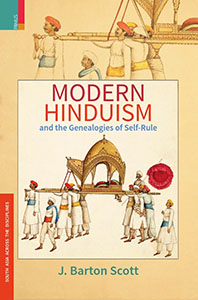
INFORMATION
- AUTHOR: J. Barton Scott
- HB ISBN : 978-93-86552-69-3
- Year: 2017
- Extent: 280 pp.
- Discount available on checkout
- Usually dispatched within 3 to 5 working days.
Modern Hinduism and the Genealogies of Self-Rule
| HB ₹ 1195 . $ . ₤ |
PB ₹ . $ . ₤ |
|
| POD ₹ . $ . ₤ |
e-Book ₹ . $ . ₤ |
INFORMATION
- AUTHOR: J. Barton Scott
- ISBN: 978-93-86552-69-3
- Year: 2017
- Extent: 400 + 40 coloured illustrations
- 10% discount + free shipping
- Usually dispatched within 3 to 5 working days.
Historians of religion have examined at length the Protestant Reformat on and the liberal idea of the self-governing individual that arose from it. In Modern Hinduism and the Genealogies of Self-Rule, J. Barton Scott reveals an unexamined piece of this story: how Protestant technologies of asceticism became entangled with Hindu spiritual practices to create an ideal of the ‘self-ruling subject’ crucial to both nineteenth-century reform culture and early twentieth-century anti-colonialism in India. Scott uses the quaint term ‘priestcraft’ to track anticlerical polemics that vilified religious hierarchy, celebrated the individual, and endeavoured to reform human subjects by freeing them from external religious influence. By drawing on English, Hindi, and Gujarati reformist writings, Scott provides a panoramic view of precisely how the spectre of the crafty priest transformed religion and politics in India.
Through this alternative genealogy of the self-ruling subject, Scott demonstrates that Hindu reform movements cannot be understood solely within the precolonial tradition, but rather need to be read alongside other movements of their period. The book’s focus moves fluidly between Britain and India—engaging thinkers such as James Mill, Keshub Chunder Sen, Max Weber, Karsandas Mulji, Helena Blavatsky, M.K. Gandhi, and others—to show how colonial Hinduism shaped major modern discourses about the self. Throughout, Scott sheds much-needed light on how the rhetoric of priestcraft and practices of worldly asceticism played a crucial role in creating a new moral and political order for twentieth-century India and demonstrates the importance of viewing the emergence of secularism through the colonial encounter.
Historians of religion have examined at length the Protestant Reformat on and the liberal idea of the self-governing individual that arose from it. In Modern Hinduism and the Genealogies of Self-Rule, J. Barton Scott reveals an unexamined piece of this story: how Protestant technologies of asceticism became entangled with Hindu spiritual practices to create an ideal of the ‘self-ruling subject’ crucial to both nineteenth-century reform culture and early twentieth-century anti-colonialism in India. Scott uses the quaint term ‘priestcraft’ to track anticlerical polemics that vilified religious hierarchy, celebrated the individual, and endeavoured to reform human subjects by freeing them from external religious influence. By drawing on English, Hindi, and Gujarati reformist writings, Scott provides a panoramic view of precisely how the spectre of the crafty priest transformed religion and politics in India.
Through this alternative genealogy of the self-ruling subject, Scott demonstrates that Hindu reform movements cannot be understood solely within the precolonial tradition, but rather need to be read alongside other movements of their period. The book’s focus moves fluidly between Britain and India—engaging thinkers such as James Mill, Keshub Chunder Sen, Max Weber, Karsandas Mulji, Helena Blavatsky, M.K. Gandhi, and others—to show how colonial Hinduism shaped major modern discourses about the self. Throughout, Scott sheds much-needed light on how the rhetoric of priestcraft and practices of worldly asceticism played a crucial role in creating a new moral and political order for twentieth-century India and demonstrates the importance of viewing the emergence of secularism through the colonial encounter.
J. Barton Scott is Assistant Professor of Historical Studies and the Study of Religion at the University of Toronto, Ontario, Canada.
Table of Contents
Table of Contents
| Acknowledgments | Ix-Xi |
| Introduction: Against The Priest | 1-30 |
| Singular Species Of Despotism | 31-59 |
| A Popular History Of Priestcraft In All Ages And Nations | 60-84 |
| Reform Affinities | 85-118 |
| Guru Is God | 119-149 |
| Pope-Lila | 150-176 |
| Astral Ethics | 177-206 |
| Conclusion: The Circulation Of Self- Rule | 207-220 |
| Notes | 221-261 |
| Index | 263-267 |




